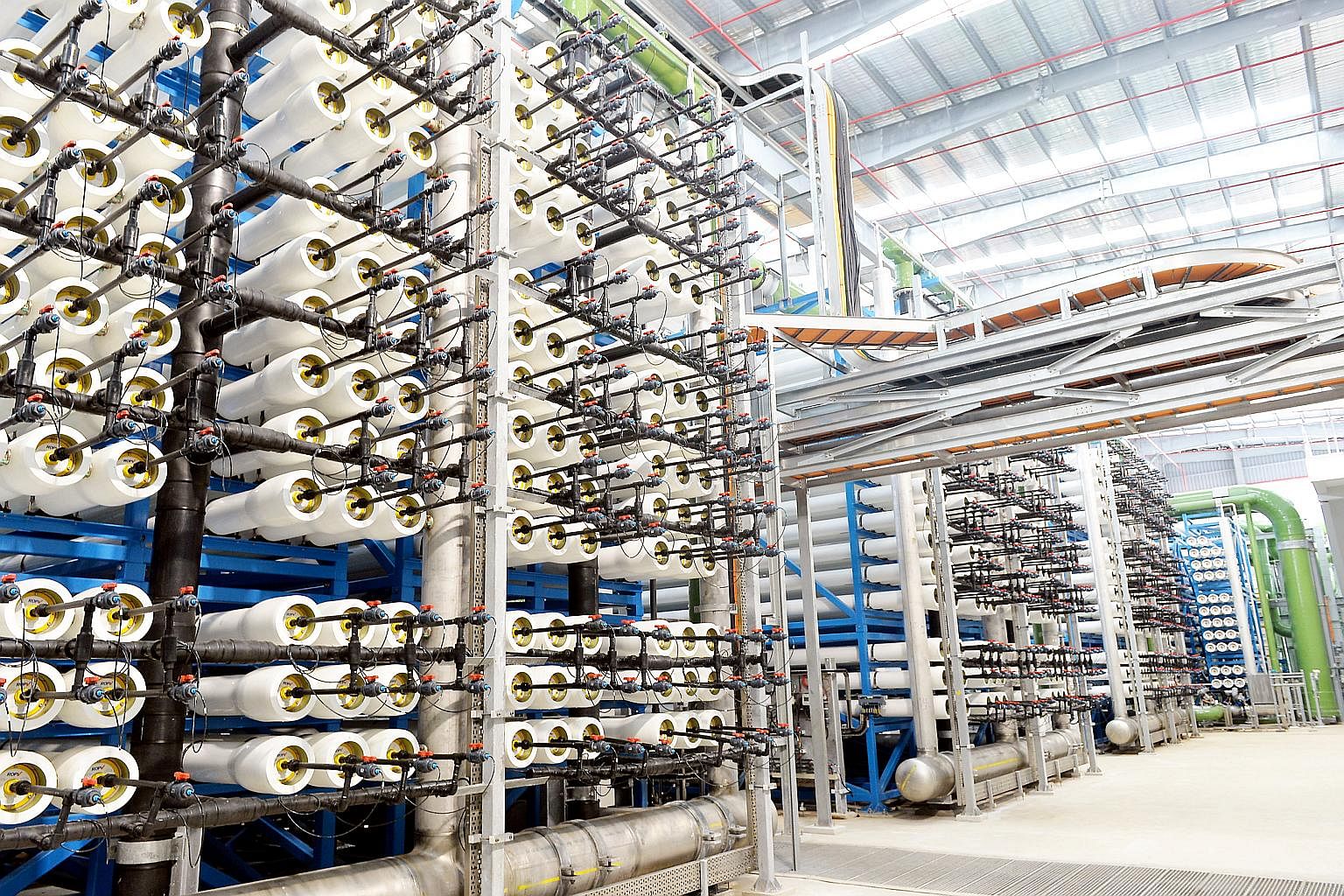PUB focuses on squeezing more value out of each drop of clean water produced
Sign up now: Get ST's newsletters delivered to your inbox

The new Tuas Desalination Plant. Up until the early 2000s, Singapore has been reliant on rain falling in its reservoirs or Malaysia's Johor River to meet its water needs.
ST PHOTO: KHALID BABA
SINGAPORE - With the search for new water sources reaching its limits, Singapore is setting its sights on another key area of research, to make sure it squeezes more value from each drop of clean water it produces.
A significant chunk of the $435 million that has gone into water research and development (R&D) here has gone into making water treatment processes less of a drain on electricity.
"We are pushing the frontier of water technology to tackle the pressing challenges in energy and sludge management efficiency," said Mr Harry Seah, national water agency PUB's assistant chief executive for future systems and technology, on Wednesday (July 4).
This comes as Singapore becomes increasingly reliant on its two weather-proof sources of water - desalination and water reuse - against a backdrop of erratic weather, he said.
"The challenge is to ensure that technological advancements continue to keep up with increasing water demand so these sources remain sustainable," Mr Seah added.
He was giving the media an update on Singapore's research into water ahead of a global water conference, the Singapore International Water Week, in Marina Bay Sands next week.
Up until the early 2000s, Singapore has been reliant on rain falling in its reservoirs or Malaysia's Johor River to meet its water needs.
A new "tap" came online in 2002 with Singapore's launch of Newater (recycled used water), and again in 2005, when the Republic's first desalination plant in Tuas was opened.
Today, both these taps can meet up to 70 per cent of Singapore's water demand of 430 million gallons a day, and are projected to help meet up to 85 per cent of future water demand in 2060. Demand for water is expected to double by then.
But both these water treatment methods require plenty of energy. Between five and 17 times more electricity than that used to treat rainwater is needed to produce water through desalination or treatment of used water. The latter also produces sludge, which is ultimately landfilled.
PUB said that meeting future water demand with today's technology will see PUB's electricity requirement go up four times to 4,000 GWh a year, with the amount of sludge generated doubling to 600,000 tonnes a year by 2060.
"This is unsustainable and can only be overcome by leveraging technology," said Mr Seah, adding that Singapore's long-term goal is to meet water demand with the current amount of energy and sludge produce.
While Singapore is not constrained by energy as it is by water and land, it is still in Singapore's interests to keep this requirement low to save on costs, and to fulfil its international climate pledge to reduce its carbon footprint, Mr Seah said.
To this end, PUB collaborates with research institutes and the private sector on research projects, including how to cut energy requirements of desalination.
One example is a collaboration on desalination technology that PUB has with American company Evoqua, that can halve energy requirements for desalination.
Assistant Professor Winston Chow from National University of Singapore's geography department said that while new water "taps", such as groundwater extraction, can be explored further, Singapore has succeeded in enhancing its water supply through desalination and Newater.
"It's thus more sensible to invest in making these taps more efficient and cheaper for both domestic and commercial water users here."
He added that there are direct and indirect environmental benefits to increasing the efficiency of the existing water treatment methods.
"The local environment directly benefits if there is reduction in brine (salty discharge from desalination) and sludge, and less energy use contributes to lowering Singapore's long-term energy intensity commitments, as set out in its pledge in the Paris Agreement," said Prof Chow.
Water expert Asit Biswas, distinguished visiting professor at the Lee Kuan Yew School of Public Policy and Stockholm Water Prize winner, cautioned that managing demand has to be an essential component of ensuring Singapore's future water security.
"We have reached a plateau in what technology can do for us in increasing water supply. Further advances are likely to be incremental rather than transformational," said Prof Biswas.
He added: "What could be transformational is significant emphasis on domestic and industrial demand management by all means available. All should realise that water is a limited and precious resource, and must be used prudently."


